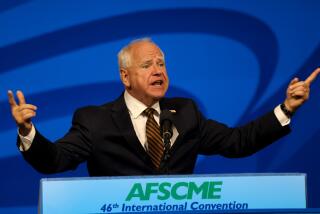Churches Tune In to Male Solidarity Movement : Spirituality: Many denominations are seeking ways to bring men back into the flock.
- Share via
Robert Bly, American poet and guru to men struggling to discover the “king” and “wild man” buried inside, has inspired hundreds of support groups across the country and workshops where men beat drums, hug, cry and sometimes grunt like animals.
It was only a matter of time until Bly’s work made inroads in the nation’s churches. And leaders of many mainline denominations say that time has come.
While the most dramatic aspects of Bly’s movement--the theatrical initiation rites and the focus on Jungian psychology--have caught on only in small pockets, religious leaders say interest in male solidarity is clearly on the rise.
“Men are searching for something, and we’re looking at what it means for the church,” said Steve Moulton of the Presbyterian Church (U.S.A.) office that oversees programs for men.
“It has implications not only for programs, but for liturgy, for theology, for language,” he said.
Program leaders in several denominations say they welcome the movement as a potential solution to a major problem that churches have faced in recent years: memberships weighted in favor of women.
During the past 25 years, when liberal, mainline churches have lost millions of members, statistics show that men have left in greater numbers than women.
“The average statistic I see is 40% men, 60% women,” Moulton said. “It used to be much more equal, and in fact, if you went back 50 to 70 years, you would probably see more men than women.”
Moulton said his office in Louisville, Ky., has started a new “Man to Man” program, pairing younger men with “mentors” who can assist their spiritual growth.
Moulton’s office also sponsored a conference in late June entitled “Male Spirituality and Church’s Response.”
Judith Frediani, who oversees adult educational programs for the Boston-based Unitarian Universalist Assn., said men’s groups in her denomination are becoming more interested in rituals--”sharing, hand-holding, singing and candle-lighting.”
And David L. Garshaw, executive for men’s ministries for the Christian Church (Disciples of Christ) in Indianapolis, said he finds men in his denomination are seeking “communication, understanding, changes in attitudes.”
Churches won’t be able to meet those needs with a study book, but rather will have to provide opportunities for them to participate in support groups, he said.
Men’s groups have come full circle,” said James Solheim, news director for the Episcopal Church in New York. “For a while, churches were dropping their men’s units, and now they are coming back.”
But they are no longer “project-oriented” as in the past, he said. “Now men just get together to talk. It’s a direct result of the new men’s sensitivity movement.”
Solheim formerly edited “Grapevine,” a publication of an ecumenical agency known as Joint Strategy and Action Committee, which featured an article in the late 1980s entitled “Where Have All the Men Gone?”
Moulton hopes that, in addition to helping offset the dwindling male population, the “Man to Man” program will boost spiritual growth among men still in the church.
He noted that a recent study by Search Institute of Minneapolis showed that faith development in men reaches its lowest level between the ages of 40 and 49.
“That ties in closely with Bly’s work, which shows that men begin to notice their ‘woundedness’ between the ages of 35 and 50,” Moulton said.
Bly, who won the National Book Award in 1986 for his poetry and is the author of best-selling books on male development, such as “Iron John,” argues that contemporary men are overly passive and emotionally stultified because of estrangement from their fathers.
“For a long time the church has tried to figure out how to get men back in church,” Moulton said. “Now we are asking, ‘If the problem for men is their relationships with their fathers, what does that mean for their relationship with God?’ ” He noted that God is often addressed by Christians as “father” and with Jesus Christ, who is known in Christian theology as “God’s son.”
Moulton said many men who are enthusiastic about programs to meet their needs are not necessarily fans of Bly.
And Garshaw noted that some Christian leaders, particularly in conservative churches, had denounced Bly’s work as “anti-Christian.”
Bly bases many of his ideas on the work of Carl Jung, who taught that human beings grow through identification with “archetypes,” or images buried deep within the self.
Bly goads men to unleash repressed “king” and “wild man” archetypes--the key, he feels, to male empowerment.
“Bly is getting a bad rap by some people in the church,” Garshaw said. “I have seen several critiques that he does not speak the language of faith.”
Garshaw feels that Bly’s perspective and at least some of his techniques should be adopted--and adapted--by churches.
In addition to Bly’s work, Garshaw said he also finds useful the work of Sam Keen, whose book “Fire in the Belly” was released earlier this year, and that of James Nelson, an ethicist who wrote “The Intimate Connection.”
“We are absolutely going to encourage this in the church,” he said. “We want to help men identify their needs” and guide them to “new visions.”
“This is a golden opportunity. It shouldn’t be missed.”
Garshaw said he had invited Bly to speak next year at a national men’s gathering of his denomination, but Bly declined, citing his own male needs.
“He said he likes to spend his summers with his kids,” Garshaw said.
More to Read
Sign up for Essential California
The most important California stories and recommendations in your inbox every morning.
You may occasionally receive promotional content from the Los Angeles Times.










